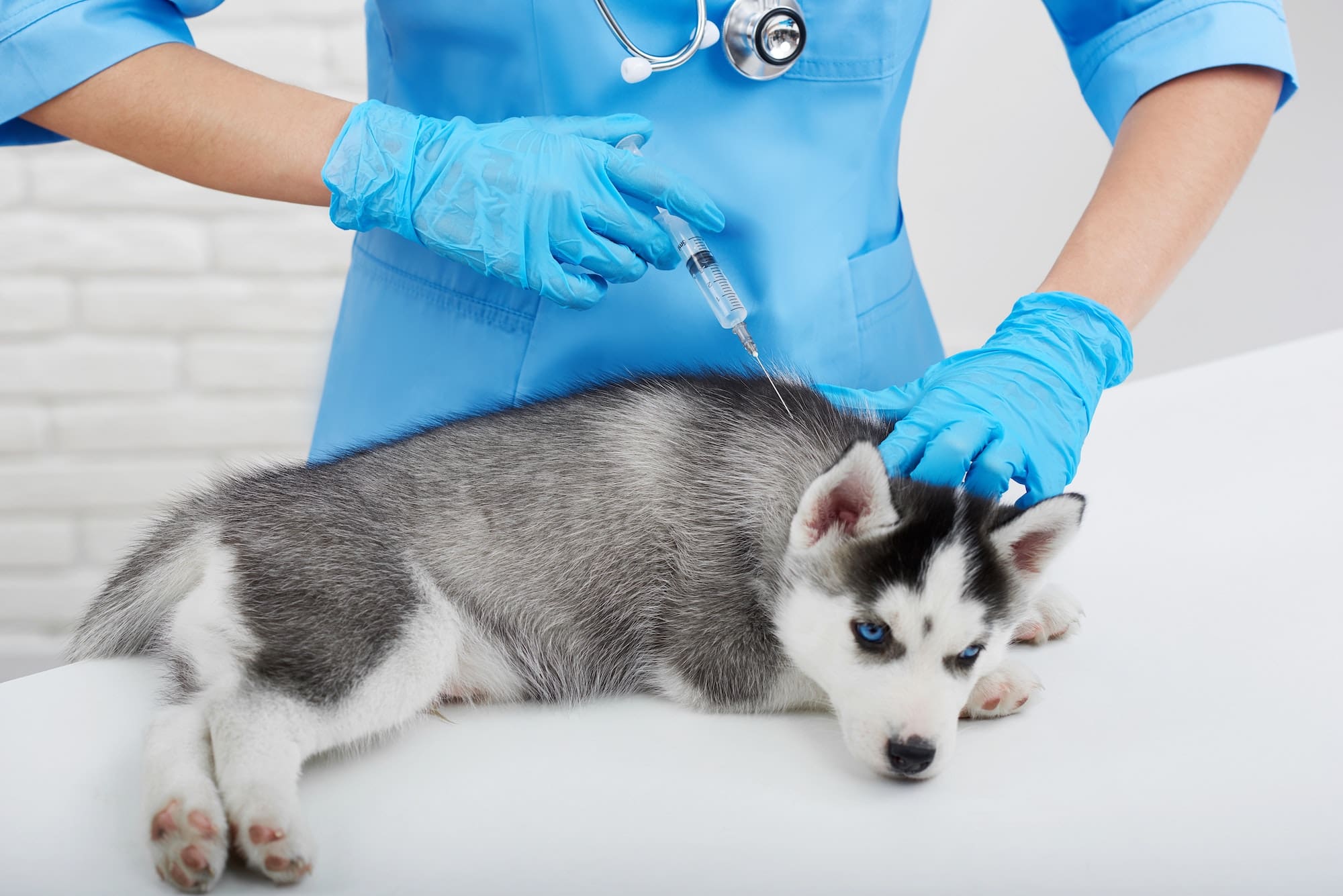If you've recently welcomed a furry bundle of joy into your home, the wellbeing of your new puppy is likely at the top of your priority list. Ensuring that your pup stays healthy and protected from potential diseases is crucial, which is why a puppy vaccination schedule is so important. By following a recommended vaccination schedule, you can provide your fur baby with the necessary protection and give them the best start in life. In this article, we'll guide you through the basics of a puppy vaccination schedule and why it's essential for keeping your pup healthy.
Why Vaccinations Are Important for Puppies
Bringing a new puppy into your home is an exciting and joyous experience. As a responsible pet owner, one of the most crucial steps you can take to ensure your puppy's health and well-being is to provide them with the necessary vaccinations. Vaccinations play a vital role in preventing and protecting puppies from deadly diseases, preventing the spread of diseases, and building immunity for a lifetime. In this article, we will explore the basics of vaccinations, the importance of puppy vaccination, the recommended vaccination schedule, core and non-core vaccines, factors to consider when vaccinating puppies, administering vaccinations, and potential side effects and risks. So, let's dive in and learn why vaccinations are essential for your furry friend's overall health.
Vaccination Basics
What are vaccines?
Vaccines are essential tools in veterinary medicine used to prevent diseases in animals. They contain either killed or modified forms of viruses, bacteria, or other pathogens that cause diseases. When administered to a puppy, vaccines stimulate their immune system to recognize and fight the particular disease. By doing so, vaccines provide puppies with immunity against potentially life-threatening diseases.
How do vaccines work?
Vaccines work by teaching the immune system how to recognize and respond to specific infectious agents. When a vaccine is administered, it introduces antigens, typically proteins, from the disease-causing organisms into the puppy's body. These antigens are recognized as foreign by the immune system, which then launches a targeted attack to eliminate them. If the puppy is later exposed to the actual infectious agent, their immune system can mount a more rapid and effective response, preventing the disease from taking hold or reducing the severity of the symptoms.
Different types of vaccines
There are different types of vaccines used to protect dogs and puppies against various diseases. The two primary categories of vaccines include:
- Core vaccines: Core vaccines are recommended for all puppies, regardless of their lifestyle or environment. These vaccines protect against highly contagious and potentially fatal diseases, such as distemper, parvovirus, adenovirus, and rabies. They are considered essential for every puppy's overall health and well-being.
- Non-core vaccines: Non-core vaccines are recommended for puppies based on their breed, lifestyle, and geographic location. These vaccines protect against diseases that may be prevalent in certain areas or environments, such as bordetella bronchiseptica (kennel cough), leptospirosis, Lyme disease, and canine influenza. The decision to administer non-core vaccines depends on the individual puppy's risk factors.
Importance of Puppy Vaccination
Protects against deadly diseases
One of the most critical reasons why vaccination is important for puppies is to protect them against deadly diseases. Puppies have underdeveloped immune systems, making them highly susceptible to infections. Diseases like distemper and parvovirus can be devastating, causing severe illness and even death. By ensuring your puppy receives the necessary vaccinations, you provide them with the best chance of staying healthy and protected against these life-threatening diseases.
Prevents the spread of diseases
Another significant benefit of puppy vaccination is the prevention of disease spread. Vaccines not only protect individual puppies but also contribute to the overall health of the canine population. Diseases like parvovirus and kennel cough can spread rapidly among dogs, especially in places with high dog populations like parks, boarding facilities, and dog shows. Vaccinating your puppy helps reduce the transmission of these diseases, ensuring the well-being of not only your furry friend but other dogs in the community as well.
Builds immunity for a lifetime
Proper vaccination in puppyhood lays the foundation for lifelong immunity. Vaccines stimulate the development of antibodies and memory cells in a puppy's immune system. These memory cells remember the specific disease-causing agents encountered through vaccination and can launch a swift immune response if the puppy is ever exposed to the actual infectious agent. By building immunity through vaccinations, your puppy stands a better chance of fighting off infections throughout their life, keeping them healthier and happier for years to come.
Recommended Vaccination Schedule
Age-specific vaccination timeline
The recommended vaccination schedule for puppies is based on their age and individual risk factors. Generally, puppies receive a series of vaccines starting at around 6-8 weeks of age, with additional booster shots administered at specific intervals until they reach around 16-20 weeks of age. The exact timing and number of vaccinations may vary depending on the vaccine manufacturer's guidelines and your veterinarian's recommendations. It is crucial to consult with your veterinarian to determine the best vaccination schedule for your puppy.
Core and non-core vaccinations
Core vaccinations are essential for all puppies and provide protection against diseases that are widespread, highly contagious, and potentially fatal. These core vaccines include distemper, parvovirus, adenovirus, and rabies. Non-core vaccines, on the other hand, are recommended based on the individual puppy's specific risk factors, such as breed, lifestyle, and geographic location. Examples of non-core vaccines include bordetella bronchiseptica, leptospirosis, Lyme disease, and canine influenza. Your veterinarian can guide you in determining which non-core vaccines are necessary for your puppy.
Additional considerations for high-risk puppies
Some puppies may have additional risk factors that require extra attention when it comes to vaccinations. High-risk puppies may include those residing in areas with a high incidence of certain diseases or those with compromised immune systems. In these cases, your veterinarian may recommend additional vaccinations or a modified vaccination schedule. High-risk puppies may need extra protection to ensure their health and well-being.
Core Vaccinations for Puppies
Distemper
Distemper is a highly contagious and potentially fatal disease that affects puppies and dogs. It is caused by the canine distemper virus (CDV) and can lead to symptoms such as respiratory problems, neurological issues, and gastrointestinal distress. Distemper vaccinations are crucial in protecting puppies against this devastating disease.
Parvovirus
Parvovirus is a highly contagious viral infection that primarily affects puppies. It can cause severe dehydration, vomiting, diarrhea, and even death. Parvovirus is especially prevalent in areas with a high dog population and can survive in the environment for extended periods. Vaccinating against this disease is essential to ensure the well-being of your puppy and prevent the spread of the virus.
Adenovirus
Adenovirus, specifically canine adenovirus type 2 (CAV-2), is a respiratory virus that can cause infectious tracheobronchitis, commonly known as kennel cough. Kennel cough is highly contagious and can be easily spread in places where dogs congregate, such as kennels, grooming salons, and dog parks. Vaccinating against adenovirus helps protect puppies from this respiratory infection.
Rabies
Rabies is a deadly viral disease that affects all mammals, including dogs and humans. It is transmitted through the saliva of infected animals and attacks the nervous system. Rabies vaccinations are not only crucial for the well-being of your puppy but also required by law in many areas. Vaccinating your puppy against rabies helps prevent this fatal disease and ensures their safety.
Non-Core Vaccinations for Puppies
Bordetella bronchiseptica
Bordetella bronchiseptica, also known as kennel cough, is a highly contagious respiratory infection that can cause a persistent cough, sneezing, and nasal discharge in puppies. It is commonly spread in environments where dogs come into close contact, such as boarding facilities and doggy daycare centers. Vaccinating against bordetella bronchiseptica is essential, especially if your puppy is regularly in contact with other dogs.
Leptospirosis
Leptospirosis is a bacterial infection that can affect both dogs and humans. It is primarily transmitted through contact with contaminated water or the urine of infected animals. Leptospirosis can lead to kidney and liver damage and can be potentially fatal. Vaccinating against leptospirosis is recommended for puppies who live in or frequently visit areas with known leptospirosis outbreaks or have access to bodies of water.
Lyme disease
Lyme disease is a tick-borne illness caused by the bacterium Borrelia burgdorferi. It can cause symptoms such as fever, lameness, and joint swelling in puppies. Lyme disease is prevalent in areas with a high tick population. Vaccinating against Lyme disease is beneficial for puppies who live in or visit regions known for tick infestations.
Canine influenza
Canine influenza, also known as dog flu, is a highly contagious respiratory infection that can cause coughing, sneezing, and fever in puppies. It can spread quickly in environments where dogs gather, such as dog shows and boarding facilities. Vaccinating puppies against canine influenza is crucial, especially if they are regularly exposed to other dogs or frequent high-risk areas.
Factors to Consider When Vaccinating Puppies
Size and breed considerations
The size and breed of your puppy can influence their vaccination needs. Some breeds may have a higher prevalence of certain diseases, making certain vaccinations more important. Additionally, small-sized puppies may require different vaccine dosages or intervals compared to large-sized puppies. Consult with your veterinarian to ensure your puppy receives the appropriate vaccinations based on their size and breed.
Location and exposure risk
The geographic location where your puppy resides or frequently visits can impact their risk of exposure to certain diseases. Some diseases may be more prevalent in specific regions, while others may be more common in urban or rural areas. Understanding the potential diseases in your area and your puppy's exposure risk is essential when determining which vaccinations your puppy needs.
Health status and medical history
Your puppy's health status and medical history are important factors to consider when vaccinating them. Puppies with compromised immune systems, underlying health conditions, or a history of adverse reactions to vaccines may require a modified vaccination schedule or additional precautions. Discuss your puppy's health status and medical history with your veterinarian to ensure their vaccinations are tailored to their specific needs.
Administering Vaccinations to Puppies
Choosing a veterinarian
Selecting a veterinarian who prioritizes puppy vaccinations and follows best vaccination practices is crucial. A knowledgeable and experienced veterinarian will guide you through the vaccination process, help determine the appropriate vaccines for your puppy, and administer them safely. Establishing a good relationship with a trusted veterinarian ensures that your puppy receives the best possible care and protection against diseases.
Proper vaccine storage and handling
Vaccines are delicate biological products that require proper storage and handling to remain effective. Vaccines should be stored at the recommended temperature and protected from light. Additionally, vaccines should be prepared and administered according to the manufacturer's instructions to ensure their effectiveness. Your veterinarian is responsible for ensuring proper vaccine storage and handling to provide your puppy with the most effective vaccines.
Vaccination techniques and precautions
Vaccinations are typically administered through injections, either subcutaneously or intramuscularly. Proper techniques, appropriate needle sizes, and precautions should be followed during the vaccination process to minimize any discomfort or potential complications. Your veterinarian will employ these techniques and precautions to ensure the vaccination process is safe and stress-free for your puppy.
Potential Side Effects and Risks
Mild and common side effects
Like any medical intervention, vaccinations can have side effects, although they are usually mild and temporary. Common side effects of vaccinations in puppies may include mild soreness at the injection site, lethargy, or a slight decrease in appetite. These side effects are generally short-lived and resolve on their own within a day or two. If you notice any concerning or persistent reactions, consult your veterinarian.
Rare but serious risks
While rare, serious adverse reactions to vaccines can occur in puppies. These reactions may include severe allergic reactions, anaphylaxis, or vaccine-related sarcomas (a type of cancer). Although these serious risks exist, they are exceedingly uncommon. The benefits of vaccination in preventing deadly diseases overwhelmingly outweigh the small risks associated with vaccinations.
Allergic reactions and contraindications
Puppies may occasionally develop allergic reactions to certain vaccine components. Signs of an allergic reaction may include facial swelling, hives, difficulty breathing, or collapse. If you suspect your puppy is experiencing an allergic reaction to a vaccine, seek immediate veterinary attention. Additionally, certain medical conditions or previous adverse reactions may contraindicate specific vaccines for your puppy. It is essential to inform your veterinarian of any known allergies or past vaccine reactions before vaccination.
Conclusion
Vaccinations are a critical aspect of responsible puppy ownership. By vaccinating your puppy, you protect them against deadly diseases, prevent the spread of diseases, and build immunity for a healthy and happy life. Follow the recommended vaccination schedule, ensure your puppy receives both core and non-core vaccines based on their risk factors, and consider factors such as size, breed, location, and health status when vaccinating. By administering vaccinations in consultation with a trusted veterinarian and monitoring for any potential side effects or risks, you provide your puppy with the best chance of a long, healthy, and disease-free life. Remember, vaccinations are not only important for your puppy's well-being but also contribute to the overall health of the entire canine community. So, stay proactive, stay informed, and prioritize your puppy's vaccinations for a brighter future together.






